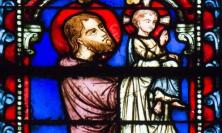Examining your own experience might sound like a process of which you ought to be in control, but doing so in the Examen is not about trying to tell your own story. Instead, says Rob Marsh SJ, ‘we ask to hear a little of God’s story being woven from the fabric of our life.’ In third stage of our Advent Examen, take up St Ignatius’s invitation to ask an account of your soul.
Read the guide to the Examen on which the format of our Advent Examen is based.
I sometimes feel I get mixed messages about Advent. What is it that is coming – is it the death of the age or the surprise of a vulnerable new life? Is this waiting and expectation a time of joyful hope or a challenge to change before it is too late? Should I be detaching from the rush to Christmas or throwing myself in headlong?
Advent presents us with an array of stories, and prompts us to listen to and let ourselves be moved by them. They are stories of longing and desire, desire for something to change, for a break with the past and the start of a new age. They confront us with our own need to change, to be changed. We get to learn the story of our own desires and fears, what draws us on and what holds us back.
Advent invites us to self-examination. Cue the Examen.
We come to the third point of the Examen, the examination that gives it its name. But what are we examining and what are we examining it for? Well, we are examining our recent past experience – the last few hours or the last day, sometimes a longer period if it seems helpful – because Ignatius believes God is to be found there, is finding us there. ‘Examining’ suggests a rather forensic activity, diligently probing for evidence of something, taking our experience apart to see how it ticks. Most practitioners of the Examen prefer a more neutral term like ‘reviewing’, ‘looking over’ or even ‘playing back’ our experience. Ignatius’s own language is interestingly different. He puts it the following way:
The third point is to ask an account of my soul from the hour of rising to the present examen, hour by hour or from one period to another. (Spiritual Exercises, §43)
‘To ask an account of my soul’: at times in Ignatian history this expected account has leaned heavily towards accountancy, itemising and counting and keeping tally and, most tellingly of examining conscience, totting up transgressions. But there is another reading of the phrase that is more revealing and more helpful. When we ask for an ‘account’, we ask for a narrative, a story. What story, what stories, does your soul tell about the many moments you have lived today?
And, notice, we have to ask: we don’t just know by glancing. Where ‘examination’ suggests an activity we can get on with alone, ‘asking an account’ tells us to rely on the cooperation of another. It suggests a stance of curiosity and openness. We don’t know the story our soul will tell until we have asked and listened and learned. The previous two points of the Examen should have put us in the right frame of mind. We started with concrete gratitude and a thankfulness that helps us lean away from blinkered self-criticism, and we prayed for light to see gracefully what God sees. Now we ask to hear a story told from our experience.
Truth be told, we are always awash with stories, too many of them. As Ignatius sees it, we always have the good spirit and the bad spirit spinning stories about what is unfolding in our day, the one to help us ‘move forward’, the other to ‘disturb with false reasonings so as to impede progress’. (Spiritual Exercises, §315). The Examen is about tuning in to these whispered, contrasting stories about our life and asking for an account that tells God’s story in us. The Examen is a practice of discernment of spirits.
What is a story anyway? Imagine we had CCTV footage of our day: would that be our story? No. A story includes some things and omits others. It has a viewpoint, and a viewpoint entails significance, entails meaning, entails care. A story is never read directly from memory; it is told, constructed from the buzzing, blooming confusion of our remembered experience. Our day becomes a story because we have desires and fears, and some of those desires we satisfy, and some we fail to satisfy, and some we satisfy and wish we hadn’t. When we ask our soul for a story of our day we are asking about desire and shame, and therein lies both the key to the Examen and its easiest pitfall.
Desire is crucial to examining our day. When we review our day in prayer, we don’t look at every single moment; we see what we care about, what seems significant, the places and people that have moved us, the little things that nag us in hindsight. But if we are too blinkered by our desires and shames we will only see what we already think we know. We ask instead to be surprised by reality. We ask to hear a little of God’s story being woven from the fabric of our life.
It takes practice to learn the particular stories the good spirit and the bad spirit habitually tell in us. As a rule, the bad spirit stories are more numerous, more strident and more familiarly convincing. So much so that they can be like water to the fish, everywhere and yet invisible. They speak with the accusing voice Ignatius calls the Enemy of our human nature. The good spirit is, annoyingly, more modest and more subtle and more surprising. First we have to learn to notice the difference and we do that by paying attention to where the stories take us – the opinions, the feelings, the moods they inspire. The more we tell the difference and respond appropriately (the next two parts of the Examen), the better our nose becomes at sniffing out the differences.
The Examen, then, both trains us in discernment of spirits and lets us practise discernment as a tool for our conversion; but, if we let it be, it is more than just a tool. As we discern the stories the good spirit tells, we get the chance to shift our attention from the story to the storyteller. Our experience, remembered, discerned, brought to life, becomes a place where we can meet the God who is in all things, and find that God alive and involved in the moments of our lives.
Discovering and befriending - or being befriended by! – the God incarnate in our days makes the Examen a very Advent habit.
Rob Marsh SJ is a tutor in spirituality at Campion Hall, University of Oxford.
Pray the Examen with Pray as you go:






